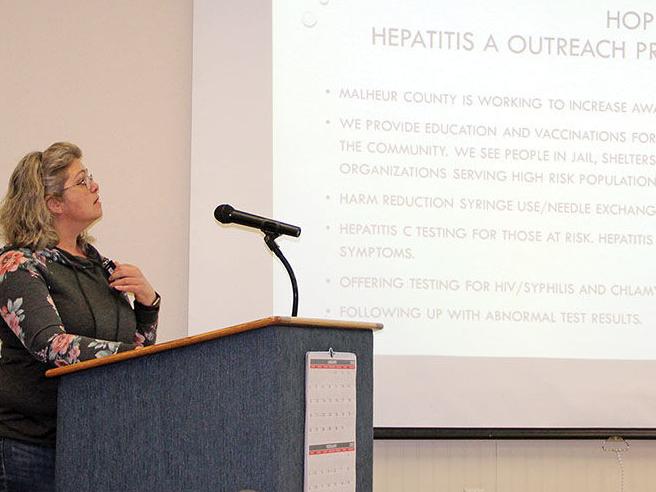Malheur County health official says local STIs —chlamydia, hepatitis, still up - Ontario Argus Observer

ONTARIO — Malheur County Health Department’s Mary Lue Galligar, RN, gave a presentation to the Ontario City Council recently, informing them about the rates of sexually transmitted infections (commonly called STIs) present in the county and the services offered by Malheur County Health Department in response to these infections.
One such program launched locally by the department is an initiative to lessen the amount of Hepatitis A outbreaks. Following is question-and-answer with Galligar, which she responded to via email, pertaining to this topic.
Argus: When did this program begin?
Galligar: The Oregon Immunization Program sent out notice of a grant opportunity in the fall of 2019 for Hepatitis A Outbreak Prevention. We’ve been fortunate in Malheur County not to have had any cases of Hepatitis A reported, but there have been outbreaks around the country, including in neighboring Southwest Idaho. We decided to pursue the funding opportunity to try to proactively prevent an outbreak of Hepatitis A here, as well as to address other communicable diseases of concern at the same time. We were awarded funding, and in November of 2019, began the Hepatitis A Outbreak Prevention Project (HOPP), in which we do outreach clinics in the community to give vaccinations for Hepatitis A and B and do testing for Hepatitis C, HIV, syphilis, chlamydia and gonorrhea, and referral to treatment for all of the above.
Argus: How has the response been from the community?
Galligar: Our project has been well-received by the community, and we’ve been invited by various organizations to conduct outreach clinics at their facilities. People generally want to know their status, especially when they learn that these infections are often asymptomatic even while doing damage to one’s health. The fact that Hepatitis A and B are vaccine preventable and that there are treatments for the other infections we test for is an incentive for people to get vaccinated and tested.
Argus: Can you go over the statistics for chlamydia in Malheur County?
Galligar: As of 2018, Malheur County had the third-highest rate of chlamydia reports in the state, behind Jefferson and Multnomah Counties, respectively. Data can be found [on the Oregon Health Authority’s online database].
The majority of cases are reported in women, because women tend to seek well care more regularly, and those appointments often include routine testing for chlamydia. But because this is a sexually transmitted infection, we know there are partners out there who have the infection, but are not being tested. The Health Department always works to try to ensure partners of people diagnosed with reportable STIs, including chlamydia, receive appropriate treatment as well.
Argus: I also wanted to know about Hepatitis, has there been a spike in cases prompting the health department to make efforts to curb future infections?
Galligar: Our rates of Hepatitis C in Malheur County have been higher than the state average for several years, but in recent months new funding opportunities to combat the infection have become available. In addition to the testing and referral for treatment that we do as part of the HOPP, we have also been able to initiate a clean needle exchange and drop-off program and a Peer Certified Recovery Mentor program to work toward harm reduction and treatment referral for people experiencing substance use disorder. We know that new Hepatitis C infections are predominantly caused by sharing of needles or other drug injection equipment, so providing support by Recovery Mentors and a resources to prevent the reuse of injection equipment, we hope to bring the rate of Hepatitis C down in our community.

Comments
Post a Comment